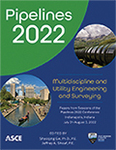Developing Software Application for Pipeline Survival Curves
Publication: Pipelines 2022
ABSTRACT
A major challenge in water pipe infrastructure asset management is determining the deterioration process for water pipes. The deterioration processes are usually modeled with a decay curve, which describes how pipe performance changes with time. Decay curves can also be used to predict the future performance of a water pipe. The methodology used to develop decay curves should be interpretable, reproducible, and validated. For the pipes with abundant failure records (usually small diameter pipes), we use survival analysis to derive the resulting failure rate function, mean time to failure, and survival curves. In this study, we develop a software application to analyze, visualize, and compare survival curves for water pipelines. The resulting survival curves can then be translated into corresponding decay curves or performance curves. The results will be piloted with water pipe systems of participating utilities.
Get full access to this article
View all available purchase options and get full access to this chapter.
REFERENCES
Chen, T. (2019). Advancing Quantitative Risk Analysis for Critical Water Infrastructure.
Chen, T. Y.-J., Beekman, J. A., and Guikema, S. D. (2017). “Drinking water distribution systems asset management: Statistical modelling of pipe breaks.” Pipelines 2017, 173–186.
Chen, T. Y.-J., Beekman Jared, A., David Guikema, S., and Shashaani, S. (2019). “Statistical Modeling in Absence of System Specific Data: Exploratory Empirical Analysis for Prediction of Water Main Breaks.” Journal of Infrastructure Systems, 25(2), 04019009.
Chen, T. Y.-J., and Guikema, S. D. (2020). “Prediction of water main failures with the spatial clustering of breaks.” Reliability Engineering & System Safety, 203, 107108.
Dawood, T., Elwakil, E., Mayol Novoa, H., and Fernando Gárate Delgado, J. (2022). “Watermain’s failure index modeling via Monte Carlo simulation and fuzzy inference system.” Engineering Failure Analysis, 134, 106100.
Dawood, T., Elwakil, E., Novoa, H. M., and Delgado, J. F. G. (2020). “Artificial intelligence for the modeling of water pipes deterioration mechanisms.” Automation in Construction, 120, 103398.
Dawood, T., Elwakil, E., Novoa, H. M., and Delgado, J. F. G. (2020). “Water pipe failure prediction and risk models: state-of-the-art review.” Canadian Journal of Civil Engineering, 47(10), 1117–1127.
Dawood, T., Elwakil, E., Novoa, H. M., and Delgado, J. F. G. (2021). “Ensemble intelligent systems for predicting water network condition index.” Sustainable Cities and Society, 73, 103104.
Dawood, T., Elwakil, E., Novoa, H. M., and Delgado, J. F. G. “An Intelligent Approach for the Condition Assessment of Watermains.” Proc., 2021 IEEE Conference on Technologies for Sustainability (SusTech), 1–7.
Dawood, T., Elwakil, E., Novoa, H. M., and Gárate Delgado, J. F. (2021). “Toward urban sustainability and clean potable water: Prediction of water quality via artificial neural networks.” Journal of Cleaner Production, 291, 125266.
Ge, S. (2016). Development of a Numerical Model to Analyze the Condition of Prestressed Concrete Cylinder Pipe (PCCP). Virginia Tech.
Ge, S., and Sinha, S. (2014). “Failure Analysis, Condition Assessment Technologies, and Performance Prediction of Prestressed-Concrete Cylinder Pipe: State-of-the-Art Literature Review.” Journal of Performance of Constructed Facilities, 28(3), 618–628.
Ge, S., Yang, D., and Kane, D. L. (2013). “Yukon River Basin long‐term (1977–2006) hydrologic and climatic analysis.” Hydrological Processes, 27(17), 2475–2484.
Kahn, C., Damiani, A., and Ge, S. (2020). “Validation of water main failure predictions: A 2-year case study.” AWWA Water Science, 2(3), e1179.
Khaleghian, H., Shan, Y., and Lewis, P. (2016). “A Case Study of Productivity Improvement by Electrical Prefabrication.” Construction Research Congress 2016, 1753–1761.
Khaleghian, H., Shan, Y., and Lewis, P. (2017). “Development of a Quality Assurance Process for Sewer Pipeline Assessment and Certification Program (PACP) Inspection Data.” Pipelines 2017, 360–369.
Lewis, P., Khaleghian, H., and Shan, Y. (2016). “Development of a Sustainable National Sewer Inventory.” Procedia Engineering, 145, 1410–1415.
Lewis, P., Shan, Y., and Khaleghian, H. (2016). “One Voice for Sewer Condition Assessment and Asset Management.” Pipelines 2016, 515–526.
Malek Mohammadi, M. (2019). Development of condition prediction models for sanitary sewer pipes.
Malek Mohammadi, M., Najafi, M., Kaushal, V., Serajiantehrani, R., Salehabadi, N., and Ashoori, T. (2019). “Sewer Pipes Condition Prediction Models: A State-of-the-Art Review.” Infrastructures, 4(4), 64.
Mohammadi, M. M., Najafi, M., Kermanshachi, S., Kaushal, V., and Serajiantehrani, R. (2020). “Factors Influencing the Condition of Sewer Pipes: State-of-the-Art Review.” Journal of Pipeline Systems Engineering and Practice, 11(4), 03120002.
Mohammadi, M. M., Najafi, M., Tabesh, A., Riley, J., and Gruber, J. (2019). “Condition Prediction of Sanitary Sewer Pipes.” Pipelines 2019, 117–126.
Senouci, A., Elabbasy, M., Elwakil, E., Abdrabou, B., and Zayed, T. (2014). “A model for predicting failure of oil pipelines.” Structure and Infrastructure Engineering, 10(3), 375–387.
Welling, S. M., and Sinha, S. K. (2014). A Novel Wastewater Pipeline Renewal Engineering Cost Data and Metadata Collection and Reporting Methodology For the WATERiD Project.
Xu, H. (2017). Seismic Fragility Assessment of Bridge and its Network Using Response Surface Models. Harbin Institute of Technology.
Xu, H. (2022). “Software Development for Fuzzy-Logic Based Pipe Condition Prediction.” Pipelines 2022.
Xu, H., and Sinha, S. K. (2019). “A Framework for Statistical Analysis of Water Pipeline Field Performance Data.” Pipelines 2019, 180–189.
Xu, H., and Sinha, S. K. (2020). “Applying Survival Analysis to Pipeline Data: Gaps and Challenges.” Pipelines 2020, 148–158.
Xu, H., and Sinha, S. K. (2021). “Modeling Pipe Break Data Using Survival Analysis with Machine Learning Imputation Methods.” Journal of Performance of Constructed Facilities, 35(5), 04021071.
Xu, H., and Sinha, S. K. (2022). Fuzzy Logic Applications for Water Pipeline Performance Analysis.” AGU Books.
Xu, H., Sinha, S. K., and Vishwakarma, A. (2020). “Development of a Fuzzy Inference Performance Rating System for Water Pipelines Using a Comprehensive List of Input Variables.” Pipelines 2020, 178–188.
Information & Authors
Information
Published In
History
Published online: Jul 28, 2022
Authors
Metrics & Citations
Metrics
Citations
Download citation
If you have the appropriate software installed, you can download article citation data to the citation manager of your choice. Simply select your manager software from the list below and click Download.
